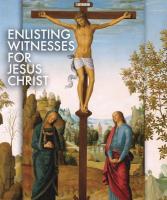Who Do You Say I Am? - Celebrating Catechetical Sunday, 2018
In 2018, Sunday, Sept. 16, is the day set aside by the Church to focus on the call of catechists and this most important ministry. It is a day to thank, in a special way, all those catechists who minister in parish faith formation programs – Catholic Schools, RCIA, Adult Faith Formation, Youth and Young Adult Formation.
The theme for this day, “Enlisting Witnesses for Jesus Christ,” flows from the Sunday Gospel when Jesus challenges the disciples to answer the question, “Who Do You Say I am?” Jesus is not kidding around. He listens to the answers and challenges the disciples to be specific. Jesus wants to know how they see him and identify him, and why they follow him.
Those who catechize, who pass on the teachings of the Catholic Church, are most effective according to how they serve as witnesses. Blessed Pope Paul VI stressed that witnessing is more important than teaching. We need catechists – teachers – but more importantly, they must be witnesses. To be a witness requires probing this relationship with Jesus Christ. This is the exciting and challenging part of being a disciple. The ultimate goal of all teaching is to invite others into this relationship, which transforms lives.
Following Jesus’ challenge to be specific about who the disciples think he is, Peter answers and says, “You are the Christ.” And then Jesus warns the disciples to tell no one about him.
What is going on?
First, Jesus wants a specific answer; and then, when he gets one, he doesn’t want the disciples to tell anyone about him. Each one of us is called into relationship with Jesus Christ. A key component in any relationship is the ability to tell others how you see this person, what your experience with them has been, and the difference they make in your life. This is what it means to be a witness.
Have you (and I know you have) been with a grandmother or grandfather and started talking about their grandchildren? They will tell you the impact this new life is in their lives. The phone will come out, the pictures will be reviewed, and the stories will be told. Names and descriptions will illustrate this relationship and how it has changed life for parents, grandparents, siblings and the world. You will know how this little one is experienced, loved and known.
Witnesses draw on their experiences and lives to describe Jesus Christ. Witnesses are persons who actively listen. The Gospel for the 24th Sunday of Ordinary Time (Mark 8:27-35) offers a model for developing the listening skills to be a disciple. First, the disciple walks with Jesus in prayer and in community. Jesus and the disciples were walking toward the villages when he posed the question, “Who do people say that I am?” The disciple draws on Scripture, the understanding of others, the saints and personal experience to discover how others see and experience Jesus.
Secondly, disciples realize that they must be specific and name Jesus – “Who do you say I am?” This calls disciples to go beyond merely naming Jesus as others see him and move into the recognition of Jesus as Christ. This naming can only come from encounter. Proclaiming Jesus Christ is a dangerous message, and Jesus responds to the disciples’ answer by laying out the reality of being a disciple of a different kind of King—one who endures suffering, death and resurrection.
When we profess to be disciples, we give witness to the living Christ. We need to be like the individual who lived simply among non-believers. Later, when a missionary arrived and started preaching Christ, the people said, "Oh we knew him; he lived in that house on the hill.” Being a disciple flows directly from the celebration of Eucharist – where we become what we receive, as Augustine says, and can be truly present as a witness to each other of the life-transforming message of Jesus. To be a disciple is to witness to Jesus Christ – the beginning and the end; the alpha and the omega; the way and the truth and the life; the bread of life; the light of the world; the door; the good shepherd; the resurrection and the life; the true vine.
Thank a Catechist today!





